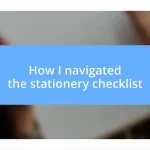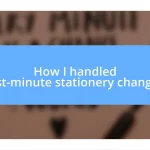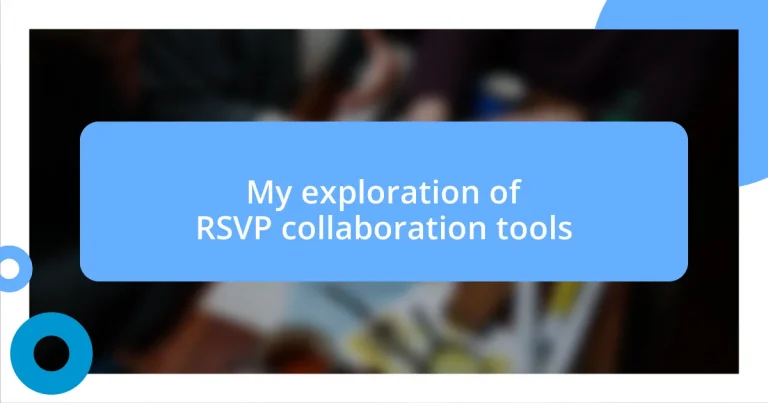Key takeaways:
- RSVP collaboration tools enhance communication and engagement through features like polls, real-time chat, and integration with other platforms, simplifying teamwork across different time zones.
- These tools provide efficiency in organizing meetings, tracking participation, and fostering inclusivity, making it easier for all members to contribute.
- Future trends include AI-driven tools for improved data analysis, real-time communication integration, and mobile-first designs, all aiming to streamline event management and enhance user experience.
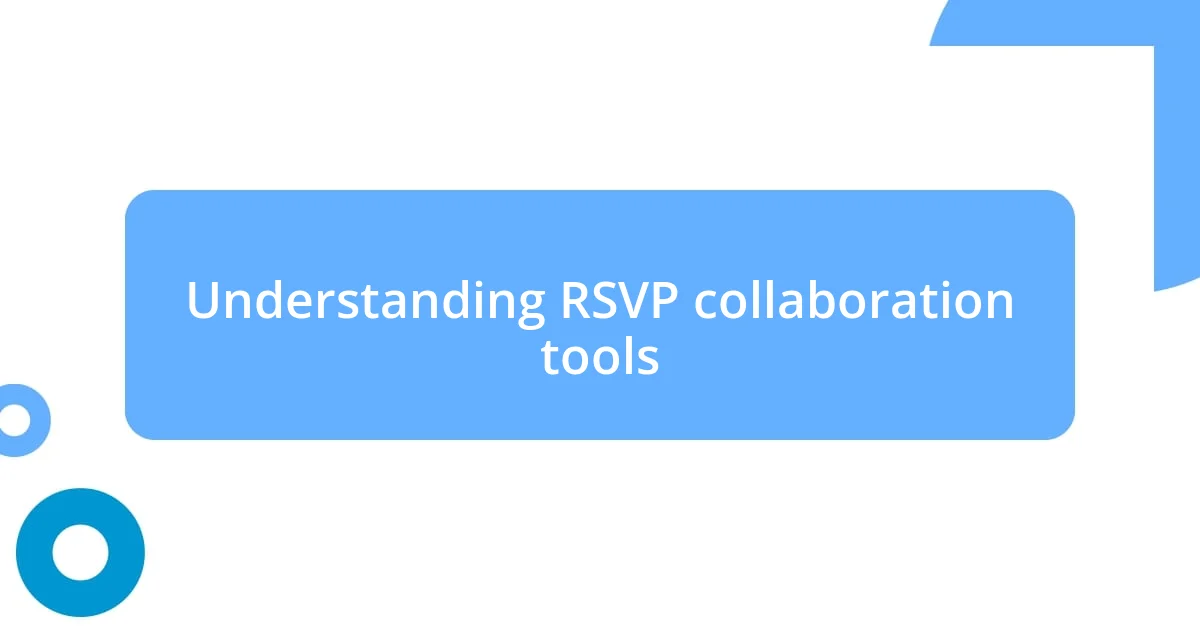
Understanding RSVP collaboration tools
In my experience, RSVP collaboration tools offer a unique blend of functionality and ease of use, making teamwork seamless. I remember a project where team members were dispersed across different time zones, and these tools helped us stay connected with not just scheduled meetings, but also real-time updates and discussions. It’s fascinating how with just a click, you can gather feedback from everyone—doesn’t that just simplify communication?
One aspect that truly stands out to me is the ability to integrate various platforms through RSVP tools. For instance, I once used a popular application that connected seamlessly with our calendar, email, and project management tools. That integration made my life much easier, allowing me to focus on creating rather than managing logistics. Have you ever felt bogged down by trying to coordinate multiple apps at once? It’s a relief when everything just flows together.
I’ve also noticed that RSVP collaboration tools often come with features that enhance engagement, like polls and real-time chat options. During a recent workshop, these features fostered a sense of community, allowing participants to express their thoughts and ideas spontaneously. It felt more like a conversation rather than a lecture. Don’t you think the more interactive a tool is, the more likely we are to contribute our best ideas?

Benefits of using RSVP tools
Using RSVP collaboration tools genuinely elevates communication within teams. I’ve found that they streamline the process of gathering responses and organizing meetings. Once, I managed a large event where the RSVP tool allowed guests to confirm their attendance effortlessly, avoiding the chaos of endless emails. That experience highlighted how efficient these tools can be for both organizers and participants.
Another benefit is the ability to track engagement and participation levels easily. I recall overseeing a team project that required constant feedback, and the RSVP tool provided analytics on who was actively involved. That insight not only informed our decisions but fostered a sense of accountability among team members. Have you ever needed to gauge interest quickly? Those tracking features can be a game-changer.
Moreover, creating an inclusive atmosphere is essential for collaboration. I remember in a brainstorming session how an RSVP tool facilitated this by allowing even the quieter members to contribute their thoughts anonymously. It’s incredible to witness how such tools break down barriers and ignite creativity. When everyone feels comfortable sharing, doesn’t it lead to far richer discussions?
| Benefit | Description |
|---|---|
| Efficiency | Streamlines communication and organization of meetings. |
| Engagement Tracking | Provides insights on team participation and activity levels. |
| Inclusivity | Encourages contributions from all members, breaking down barriers. |
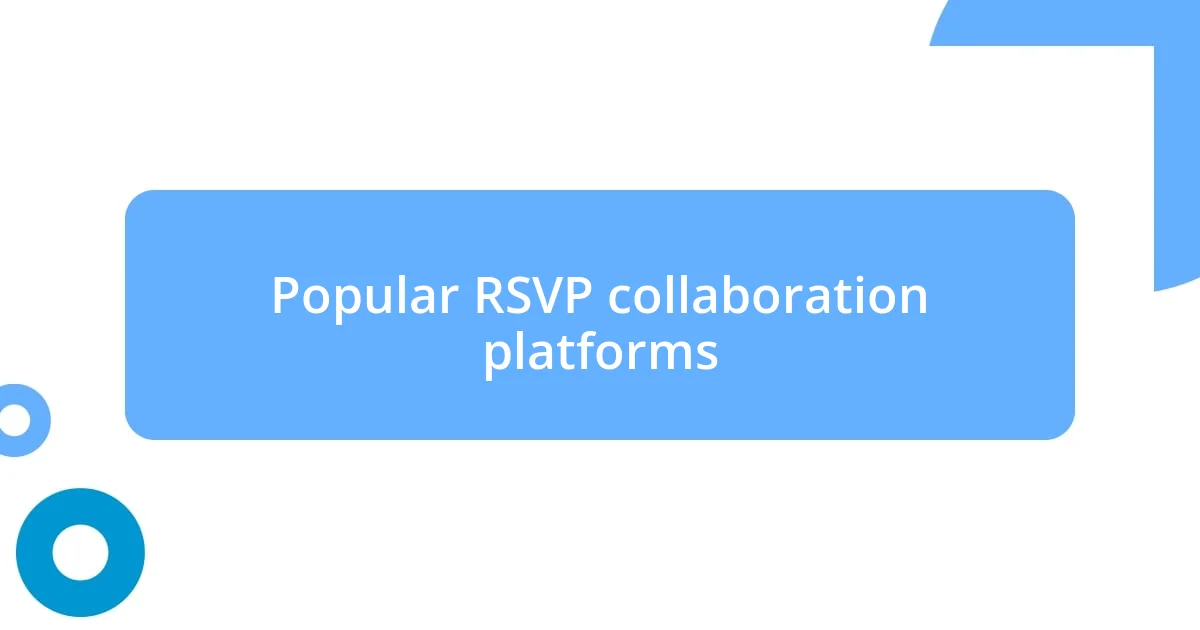
Popular RSVP collaboration platforms
Popular RSVP collaboration platforms
The landscape of RSVP collaboration platforms is quite diverse, each offering unique features that cater to different needs. I fondly recall exploring several tools for organizing a charity event; some stood out due to their intuitive designs and comprehensive functionalities. I remember being particularly impressed with how one platform made it nearly effortless to manage attendee lists while also enabling discussions—a true companion for event coordinators.
Here are some of the popular RSVP collaboration platforms that I’ve encountered:
- Eventbrite: Known for its strong event management tools, it simplifies RSVP management and ticket sales.
- Google Forms: This is a straightforward option for creating customized RSVP forms that integrate seamlessly with Google Sheets for easy data tracking.
- SurveyMonkey: Excellent for gathering feedback alongside RSVPs, with versatile survey options that help tailor the attendee experience.
- Doodle: A great choice when trying to find the best time for a meeting, allowing participants to mark their availability easily.
- Evite: This friendly, user-oriented platform is excellent for casual events, combining RSVPs with stylish invite designs.
Reflecting on my own experiences, I’ve noticed how these platforms not only make logistical tasks simpler but also enhance the enjoyment of collaborative efforts. I once used Doodle for a book club meeting, and the simplicity of finding a common time felt like a breeze. There’s something incredibly satisfying about seamlessly navigating through invitations without the typical back-and-forth emails that usually bog down coordination. Don’t you just love it when technology makes connecting with others feel effortless?
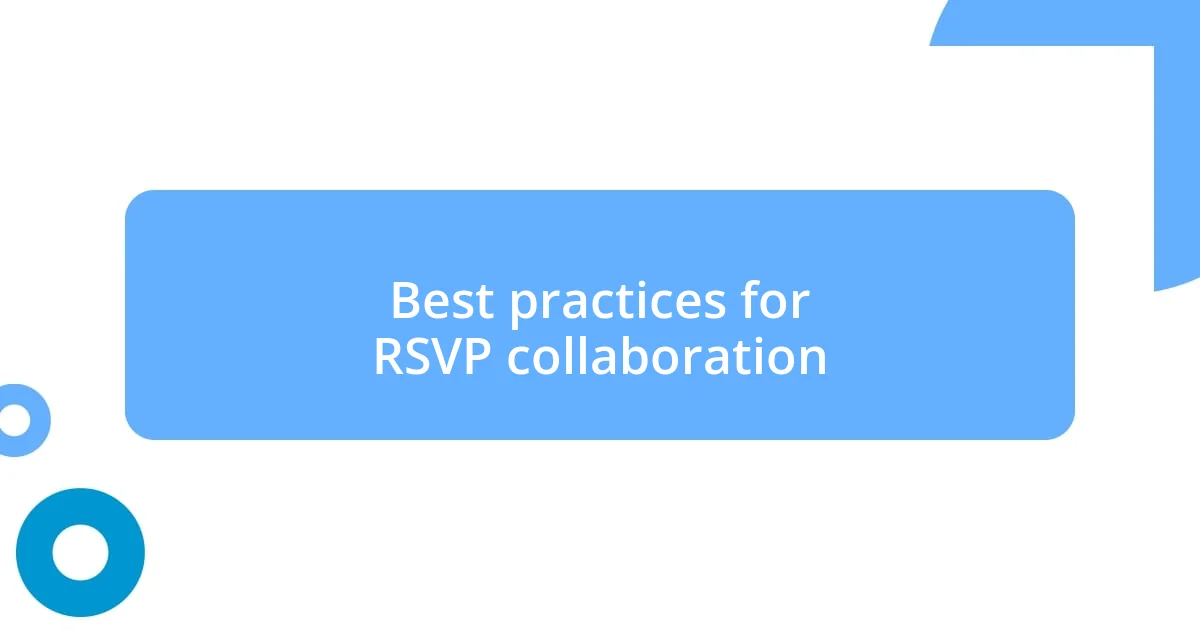
Best practices for RSVP collaboration
When it comes to RSVP collaboration, clear communication is key. I remember a time when I was coordinating a workshop and I ensured all details were transparent by updating everyone through the RSVP tool itself. This proactive approach not only kept everyone informed but also encouraged timely responses. Have you ever felt the frustration of waiting for replies? I find that directly addressing attendees about expectations can really expedite the process.
Another best practice is to personalize your invitations. Once, I crafted a heartfelt message for a reunion using an RSVP tool, and the response was overwhelming. Connecting on a personal level often results in higher engagement. Don’t you think people are more likely to respond when they feel valued?
Lastly, I learned the importance of following up. If you haven’t heard back from some participants, a gentle reminder can go a long way. I once sent a friendly nudge for an event, and it not only increased my RSVP count but also prompted conversations that enriched the experience. It’s fascinating how a little outreach can spark greater involvement, isn’t it?
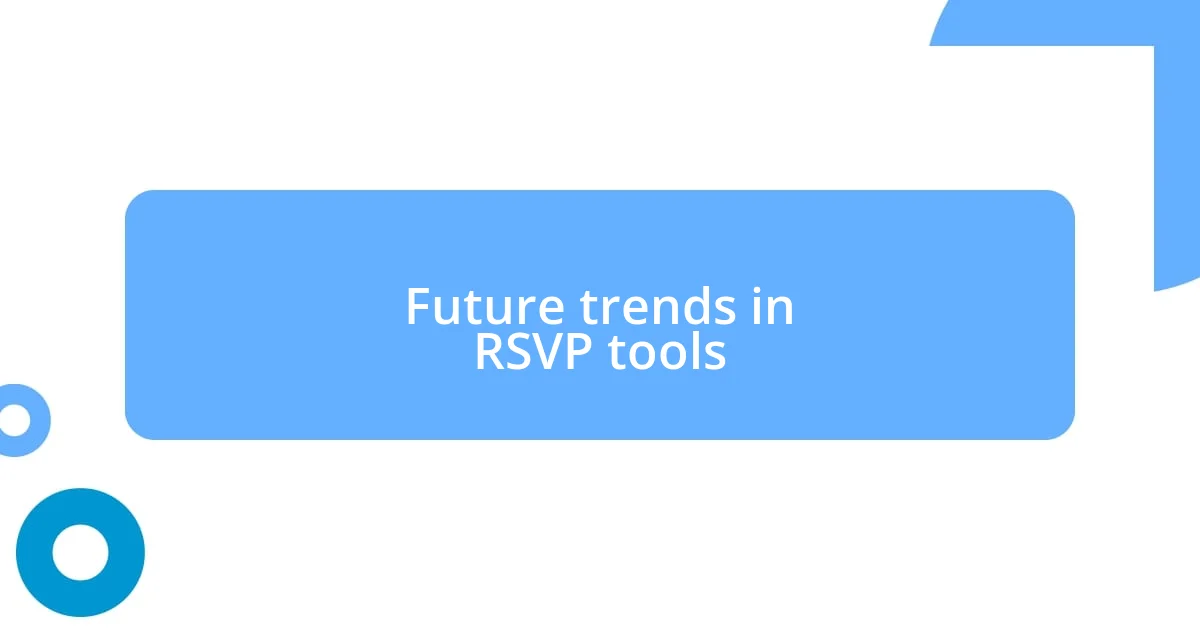
Future trends in RSVP tools
As I look ahead, it’s intriguing to think about the rise of AI-driven RSVP tools. These advancements could revolutionize how we manage events. I remember a time when I struggled with manually sifting through responses; I can only imagine how a smart algorithm could analyze attendee data, highlight patterns, and suggest optimal times for gatherings. Can you picture how that could simplify the planning process dramatically?
Another trend to watch is the integration of real-time communication platforms within RSVP tools. The more I explore this space, the more I realize the value of having everything in one place. I once experienced a last-minute change for an event, and the confusion that ensued was overwhelming. Imagine having a tool where attendees could receive updates and chat with each other seamlessly—it’s a game changer for coordination!
Lastly, the increasing focus on mobile-first designs cannot be overlooked. Nowadays, we live on our phones, and I’ve found myself more likely to respond to an RSVP when it’s easy to do so on the go. The flexibility of being able to engage with an invitation in the moment can significantly boost response rates. Isn’t it refreshing when technology aligns with our lifestyles? The future of RSVP collaboration tools is undoubtedly bright, and I can’t wait to see how it unfolds!



